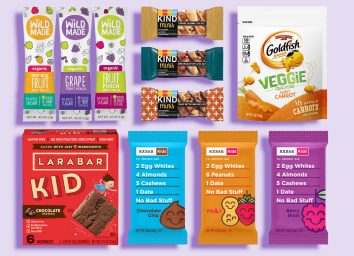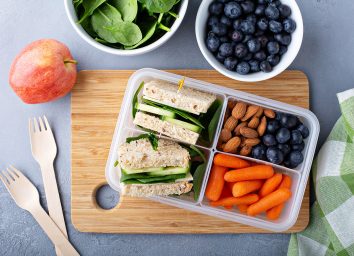Most American Children Are Deficient In These Four Major Nutrients, Says New Study

It's never too early to adopt healthy eating habits. In fact, a recent study revealed that when pregnant mothers were taught healthy feeding practices for infants, their kids consumed fewer carbohydrates and fats by age three. Additionally, they had a lower body fat content by age six than kids whose parents didn't receive nutritional training. (Keep in mind that children require healthy levels of body fat. In this context, it just means their levels aren't over recommended levels.)
The results from this study exemplify how critical it is to instill healthy eating habits at an early age, especially within the first year of life. Researchers noticed that mothers in the randomized trial began introducing ultra-processed foods (high in fat and sugar) to children as early as six months old. However, new data shows that kids between ages one and six are at high risk of significant nutritional inadequacies.

A new study published in the journal Nutrients revealed that most kids in the U.S. lack calcium, iron, vitamin D, and DHA (a type of omega-3 fatty acid). More specifically, the study examined data from the National Health and Nutrition Examination Survey (NHANES) from 2001-2016, which allowed researchers to determine the micronutrient adequacy of their diets.
Key takeaways from the study
Kids experience rapid cognitive, physical, and social growth between the ages of one and six. A diet rich in grains, lean proteins, and nutrient-dense fruits and vegetables plays a significant role in a child's development. However, data from nearly 10,000 children in the U.S. suggests that kids across the country aren't having their nutritional needs through diet alone.
For example, nearly 87% of the children from the study had inadequate vitamin D intakes—an essential nutrient for bone health and mood that may even play a role in preventing asthma. In addition, 69% of kids had inadequate intakes of vitamin E—a fat-soluble vitamin that acts as an antioxidant in the body and protects cells from oxidative stress.

"Vitamins D and E are fat-soluble vitamins that cannot be made by the body. To get proper levels, these vitamins have to be consumed in the foods we eat," says Natasha Burgert, MD, board-certified pediatrician, and nationally recognized child health expert.
"Children get deficiencies in these vitamins because their diets are often inconsistent in variety and amount. Even the most well-intentioned parent can have a hard time ensuring these vitamins are consumed in enough quantity."
Parents can ensure their kids get enough vitamin D by offering them dairy products, fatty fish (such as salmon), and fortified orange juice, Burgert says. Vitamin E can be sourced from peanut butter and dark leafy greens, such as kale and spinach.
"For many kids, however, these types of foods are not palatable," she adds. "As an alternative for children missing the needed variety of foods for balanced nutrition, offering a children's multivitamin or a toddler nutritional drink are healthy options."
How can you ensure that your child gets enough calcium, potassium, and vitamins D and E? Make a banana smoothie.
"Smoothies are a good option every once in a while," Burgert says. "You can even blend spinach for added nutrients that your toddler won't notice."
Another nutritional inadequacy of concern among kids ages one to six? Iron.
"In my practice, iron deficiency is common in infants and toddlers," she says. "Since most families don't consume large amounts of red meat or other iron-fortified foods, iron levels slowly decline over time. Low iron levels have been shown to impair optimal cognitive and social-emotional development by age five."
For more, be sure to check out School Lunch Debt in America: What It Is and How to Get and Offer Help and The Healthiest Lunches For Kids, According to Dietitians.








